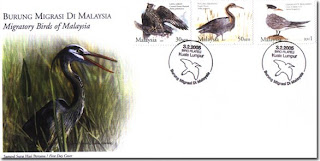 Malaysia's shores welcome millions of tourists every year. Among them, a very special group of visitors who need neither passports nor visas, although many have flown hundreds, or indeed, thousand of miles to be here.
Malaysia's shores welcome millions of tourists every year. Among them, a very special group of visitors who need neither passports nor visas, although many have flown hundreds, or indeed, thousand of miles to be here.There are Malaysia's migratory birds, from North Asia, Europe, and elsewhere.
Like many of their human counterparts, these visitors are escaping the onset of winter in the Northern Hemisphere. They are attracted to Malaysia by our warm, sunny climate and the abundance of food.
 Among the most striking of these visitors is the Purple Heron (Ardea Purpurea). The Purple Heron seeks secluded wetlands and marshes throughout Peninsular Malaysia. It is known to be shy and reclusive, and is therefore difficult to spot, despite its large size (adults can attain up to 90cm in height). However, a glimpse of its exquisite plumage of chestnut and maroon, with a faint purplish tinge, makes the effort worthwhile.
Among the most striking of these visitors is the Purple Heron (Ardea Purpurea). The Purple Heron seeks secluded wetlands and marshes throughout Peninsular Malaysia. It is known to be shy and reclusive, and is therefore difficult to spot, despite its large size (adults can attain up to 90cm in height). However, a glimpse of its exquisite plumage of chestnut and maroon, with a faint purplish tinge, makes the effort worthwhile. The Crested Honey Buzzard (Pernis Ptilorhyncus) visits our country from its breeding grounds in remote Siberia. It soars gracefully on air currents, punctuating its flights with high-pitched calls as it seeks out bees' nests, from which it feeds on honey and bee larvae. These birds have been sighted at Sepang in Selangor, Tanjung Tuan in Melaka and Pulau Kukup in Johor.
The Crested Honey Buzzard (Pernis Ptilorhyncus) visits our country from its breeding grounds in remote Siberia. It soars gracefully on air currents, punctuating its flights with high-pitched calls as it seeks out bees' nests, from which it feeds on honey and bee larvae. These birds have been sighted at Sepang in Selangor, Tanjung Tuan in Melaka and Pulau Kukup in Johor. To catch a glimpse of the Lesser Crested Tern (Sterna Bengalensis), take a drive to the coast, particularly near Langkawi. If you're lucky, you'll witness their spectacular plunging dives into the waves to catch fish. Another water lover, although perhaps less adventurous, is the Dunlin (Calidris Alpina), which leaves the bitter cold of Alaska and the Arctic Circle to walk delicately along Malaysian mudflats and sand bars, where it wades into shallow water looking for choice
To catch a glimpse of the Lesser Crested Tern (Sterna Bengalensis), take a drive to the coast, particularly near Langkawi. If you're lucky, you'll witness their spectacular plunging dives into the waves to catch fish. Another water lover, although perhaps less adventurous, is the Dunlin (Calidris Alpina), which leaves the bitter cold of Alaska and the Arctic Circle to walk delicately along Malaysian mudflats and sand bars, where it wades into shallow water looking for choice  morsels. Surprisingly, the Brown-headed Gull (Larus Brunnicephalus), a visitor from the highlands of Turkmenistan and Mongolia, can be found well inland, in addition to its more expected haunts of open seacoasts, estuaries and rivers.
morsels. Surprisingly, the Brown-headed Gull (Larus Brunnicephalus), a visitor from the highlands of Turkmenistan and Mongolia, can be found well inland, in addition to its more expected haunts of open seacoasts, estuaries and rivers.The Black-capped Kingfisher (Halcyon Pileata), ventures further north than any other kingfisher species during summer. From its home in China or Korea, it travels south in winter along our rivers, swamps and even the mangrove forests of Johor. This is one of the larger members of the kingfisher family, growing up to 28cm in length. Its powerful red bill snaps up insects, fish and frogs with equal ease, and is also used to excavate its riverbank nests.




 Technical Details
Technical DetailsDate of Issue : 3-Feb-2005
Stamp Value : 30 Sen; 50 Sen; RM 1.00
Stamp Size : 40 mm x 30 mm
Miniature Sheet Denomination : RM2.00
Miniature Sheet Size : 70mm x 100mm
Stamp Size in Miniature Sheet : 40mm x 30mm
Perforation : 14
Sheet Content : 20 Stamps
Paper : SPM Watermarked, Phosphor Coated
Printing Process : Lithography
Printer : Percetakan Keselamatan Nasional Sdn. Bhd.
Stamp Designer : Reign Associates Sdn. Bhd.
First Day Cover Value : 30 Sen
Presentation Pack Value : RM 3.50
Folder Value : RM 5.00




